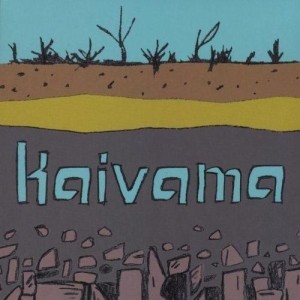Kaivama, which is fiddler Sara Pajunen and guitarist Jonathan Rundman, is making big waves in the Finnish-American cultural community of the upper Midwest. She’s from Minnesota, he’s a Yuper (that’s a native of Michigan’s Upper Peninsula), they’ve only been together for a bit over a year, but they’ve got great musical chemistry and they’re making beautiful music together on this self-titled disc.
Pajunen is a classically trained violinist and Rundman is a singer and songwriter in the Americana/powerpop vein. Both are about three-quarters ethnic Finnish. She got interested in Finnish folk music while taking a degree at the Helsinki Conservatory, and both are interested in their own roots and that of the music. The band’s name comes from a Finnish word that means to delve or dig.
The 14 tracks on Kaivama are evenly divided between traditional tunes and compositions by Pajunen, Rundman or both. One is by Arto Järvelä, fiddler for the Nordic group JPP, who also arranged and plays on a couple tracks, including the lovely “Joutsen,” a traditional polska associated with the Finnish fiddler Frank Hietala. Arto plays lead violin and Sara a harmony part she wrote, and the two are accompanied by Jonathan on a harmonium. It’s one of several instruments he plays, including an old Wurlitzer electric piano that gives songs like the first track “Schottische 150” a retro/modern sound. Sara and Jonathan wrote this one, and its title is an allusion to the sum of their individual percentages of Finnish ancestry.
The traditional “Pirun Polska” is a nifty uptempo traditional number, possibly released on record here for the first time, with Sara on violin and the octave or baritone violin, and Jonathan on tenor banjo. They’ve rearranged a traditional polka and named it “Sulo”; it also features Sara on the two violins and Jonathan on guitar and that Wurlitzer. The most traditional sounding track is probably the spare arrangement of two polkas that Sara picked up on a trip to Finland in 2010.
The duo is playing mostly unconventional arrangements of traditional tunes, and their own tunes follow suit, being recognizably based on traditional motifs but with more modern arrangements. These include Sara’s “Cross Country,” a multi-style piece that reflects the varying moods of a cross-country auto trip, on just fiddles and banjo; Jonathan’s “Edina Speedtrap,” a true folk-rock arrangement; Sara’s “Nonstop,” on which Jonathan plays an antique Hammond organ; her “Red Field” on which she plays violin and piano and Jonathan banjo, which starts as a march and ends with a brief waltz section; and the cowritten “Mosalarium” on fiddle, harmonium and “prepared” piano. It brushes up against the avant-garde not just in its use of prepared piano but also with its off-kilter counterpoint between the violin and harmonium.
Adding to the variety are tracks like Arto’s “Røros,” on which Jonathan plays another antique instrument, this time a foot-pump harmonium; and “Talviyo,” which has, in addition to piano, xylophone and a resophonic guitar, a harmonized vocal part by Sara and Jonathan.
Like so much of the best Nordic music, Kaivama’s manages to be both bracingly cool and somehow homespun and warm. (As of 2017 the duo is no longer recording or performing together but you can find the CD on Rundman’s website.)
(Salt Lady, 2011)

